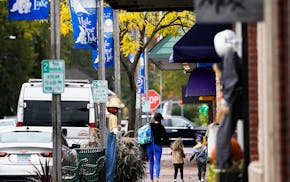DULUTH - A fight over street preaching at the annual light display in the city's Bayfront Festival Park spilled into federal court here Monday, with the city of Duluth stuck squarely in the middle.
Peter Scott, a lay preacher from Hibbing, claimed in a recent federal lawsuit that he was forbidden from preaching to passersby during last year's Bentleyville "Tour of Lights," which features a massive Christmas tree, Santa Clauses, reindeers, penguins and other holiday sculptures illuminated with more than 3 million lights. Some event organizers told him that "people don't want to hear religious crap" during the event, his suit said.
Steve Jankowski, a Duluth minister and associate of Scott's, claimed that he was warned by the city that he could be arrested for trespassing if he resists a request by event organizers to leave. He and Scott want a court order restraining the city from arresting them for expressing their religious views.
Jonathan Scruggs, an attorney with the Scottsdale, Ariz.-based Alliance Defense Fund, which advocates for religious freedom, argued Monday that the city stepped on the First Amendment when it threatened to arrest anyone who violates Bentleyville rules against political campaigning and preaching.
Lease and police
To the city, though, the matter boiled down to a common-law right that private property owners have over their own property. M. Allison Lutterman, a deputy city attorney, argued that the city implicitly granted the Bentleyville group control over the city park when it signed a lease for the property.
Scruggs agreed that a private entity like Bentleyville cannot violate the First Amendment. But he argued that the city's argument fails when police take steps to enforce the private organization's rules at a public event on public property.
"It is undisputed that this event is free and open to the public," Scruggs noted. "We're saying the policy of removing our clients under threat of arrest is a state action."
Someone might legally be subject to arrest if they tried to erect their own light displays during the event, or tried to commandeer the stage, he agreed. "They can be prevented from doing what is illegal; we don't dispute that," Scruggs said, but not for expressing their own religious views to willing listeners in a public place.
U.S. Magistrate Judge Leo Brisbois asked what would happen if the city amended the contract to restrict admission, or if it if charged an entry fee.
Scruggs agreed that might change things.
Other comments by the judge indicated the city had some convincing to do.
Brisbois asked Lutterman where in the contract the city gave Bentleyville exclusive control over the park.
"The contract is silent as to that right," Lutterman responded.
"The only area I can see where the city gave them exclusive control is one small parking lot," Brisbois said. "The contract requires that the event remain free and open to the public."
Lutterman, talking over the judge, said common law gives Bentleyville control. She said if Bentleyville officials tell people to leave and they refuse, the city has an obligation to enforce its trespassing ordinance.
Precedents for public
But Brisbois said a number of federal rulings seem to disagree, including one issued in June 2010 by U.S. District Judge John Tunheim in Minneapolis.
Tunheim affirmed a Wisconsin evangelist's First Amendment right to hand out Bibles at the Twin Cities Pride Festival in Minneapolis' Loring Park over the sponsor's objections, providing he's not disruptive. The $36,000 fee the organizers paid for a permit to use the park did not give them the right to restrict the speech of those in it, Tunheim concluded.
Lutterman argued that Bayfront is not a traditional "passive park" because it was designed with the idea of leasing it out for events.
Brisbois argued with her about whether a public playground and sidewalks that pass through and around the park leave a different impression.
Lutterman remained adamant, however, that the plaintiffs had no case. "The court has no authority to tell Bentleyville that it can't exclude someone based on the content of their speech," she said.
"Judge Tunheim has disagreed with you, and so have several others," Brisbois said.
Brisbois said he'd issue a report and recommendation for ruling by Chief U.S. District Judge Michael Davis within a day or two.
Dan Browning • 612-673-4493
4 are now charged in inside job armed robbery of Hopkins grocery store that netted $45K

Minnesota added thousands of jobs in March but worker shortage still an issue
Private prison van driver, accused of raping St. Paul woman he was transporting, gets 30 years for similar attacks

